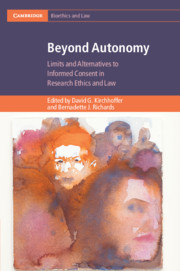Book contents
- Beyond Autonomy
- Cambridge Bioethics and Law
- Beyond Autonomy
- Copyright page
- Contents
- Tables
- Contributors
- Acknowledgements
- Introduction
- Part I Exploring Problems of Respect for Autonomy in Bioethics, Law and Society
- Part II The Search for Alternative or Complementary Concepts Surrounding Autonomy
- 5 Self-Ownership in Research Ethics
- 6 Beneficence in Research Ethics
- 7 Dignity, Being and Becoming in Research Ethics
- 8 Virtues in Research Ethics
- Part III Beyond Autonomy: Turning to the Community to Protect the Individual
- Index
- Books in the Series
8 - Virtues in Research Ethics
Developing an Empirically Informed Account of Virtues in Biomedical Research Practice
from Part II - The Search for Alternative or Complementary Concepts Surrounding Autonomy
Published online by Cambridge University Press: 20 September 2019
- Beyond Autonomy
- Cambridge Bioethics and Law
- Beyond Autonomy
- Copyright page
- Contents
- Tables
- Contributors
- Acknowledgements
- Introduction
- Part I Exploring Problems of Respect for Autonomy in Bioethics, Law and Society
- Part II The Search for Alternative or Complementary Concepts Surrounding Autonomy
- 5 Self-Ownership in Research Ethics
- 6 Beneficence in Research Ethics
- 7 Dignity, Being and Becoming in Research Ethics
- 8 Virtues in Research Ethics
- Part III Beyond Autonomy: Turning to the Community to Protect the Individual
- Index
- Books in the Series
Summary
In recent years philosophers have developed accounts of virtues and virtue ethics that are more empirically informed than those of their predecessors. These contemporary accounts commonly see acting virtuously as requiring agents to develop, among other things, deliberative strategies that identify and counter prevalent cognitive biases and various situational factors that can impede virtuous action. Such accounts thereby adopt a comprehensive conception of virtuous character traits, according to which practically intelligent virtues include an awareness of situational factors that conduce to or inhibit virtuous behaviour. However, these contemporary accounts of virtue have not yet been extended very far into professional role virtues, and so tend to say little about the ways in which broader institutional and regulatory environments can sometimes support or inhibit the successful exercise of the relevant role virtues by those who are working in these environments.
- Type
- Chapter
- Information
- Beyond AutonomyLimits and Alternatives to Informed Consent in Research Ethics and Law, pp. 133 - 150Publisher: Cambridge University PressPrint publication year: 2019

